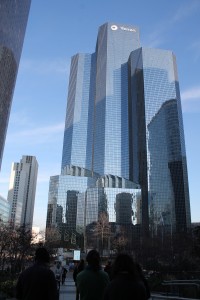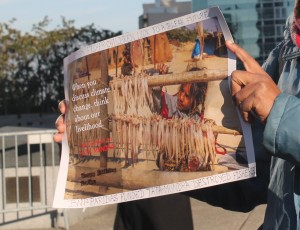By Margherita Tommasini
The lobbying tour, organized by Corporate Europe Observatory, took place on December 3rd 2015, with the goal of bringing the buildings of the Parisian business district La Dèfense to life: they are seats of power, where decisions are influenced, where lobbyists work and wield power.
Read more about the tour and its first stop (Engie) at Lobbying Chronicles: Part I
Stop two: Total
Total is a French multinational company, one of the major in Europe, whose business cover the entire oil and gas chain, from the exploration and the extraction of the fossil fuels, to power generation including the transportation and the distribution of energy, while also being involved in products trading.
Total’s lobbying for natural gas within the European Union context has been very effective. Total’s goal is to gain the image of “green champion” and it is doing so by re-branding natural gas as the clean energy for a sustainable future. Together with other companies, it has formed a think tank that pushes natural gas as the solution to climate change.
At first look, the shift from coal to natural gas seems a reasonable move to tackle climate change and energy demand. Coal is the dirtiest energy source and it is accountable for decades and decades of climate trashing. From a purely technical perspective, natural gas – when burnt – releases half of the amount of CO2 emissions than coal. However, by expanding the picture and considering the life cycle, natural gas is far dirtier than they try to have us believe. On top of a very polluting and extraction process (especially if happening through hydraulic fracturing) the the phenomenon of methane leakage make so that over a period of twenty years, methane is eighty times more pollutant for the atmosphere and the climate than CO2. In these terms, the actual footprint of natural gas is actually larger than the footprint of coal. The bottom line is the following: natural gas will not solve climate change, it is just an expedient for business to continue business as usual. They got already the infrastructure, the pipelines, and the experts. The push for natural gas is the perfect solution from the corporate perspective: they are willing to sacrifice the coal industry to keep the profits running.

In terms of lobbying, the argument that gas is clean and that gas can be one of the solutions, is a very strong message that managed to influence the European energy targets for 2030. The target sets the goal of 40% greenhouse gases emission reduction and 27% renewable energy generation by 2030. Part of the lobbying strategy aimed at infiltrating the “opposition”. Both solar and wind energy association have been infiltrated and their ambitions weakened. As for Total, it has got control over two very important seats within the energy associations for solar and wind. When the debate on energy target started, within the European Union, the goal of 100% renewable energy was quickly removed, with a way less ambitious 45%, which was further reduced to the current 27%, “supported” by a “complementary” push for natural gas. The results are quite discomforting: the energy targets for the European Union are not ambitious, are not supporting the development and diffusion of renewable energies, and are not supporting real solutions.
Stop Three: BNP Paribas
BNP Paribas is a French multinational bank, and financial services company, one of the largest in the world. BNP also “excels” in terms of being a major funders of coal and fossil fuels. Even though discussions and debates about the gravity of climate change were already taking place, BNP Paribas has progressively growing investments in the coal sector.
In terms of community impact, BNP has been directly involved in the funding of a four giga-watt coal power plant in India, the Tata Mundra plant, which affects the livelihood of thousands of fish workers by dumping gallons and gallons of warm water from the plant into the naturally colder water of the coastal area. The fishermen have pursued inquires, especially after reports have highlighted increases in respiratory problems and other health issues coinciding with the start of the coal plant and its operating time, but the only answers they have received were more reports from those who funded the project, which protect the operations of the plant.

To be continued…